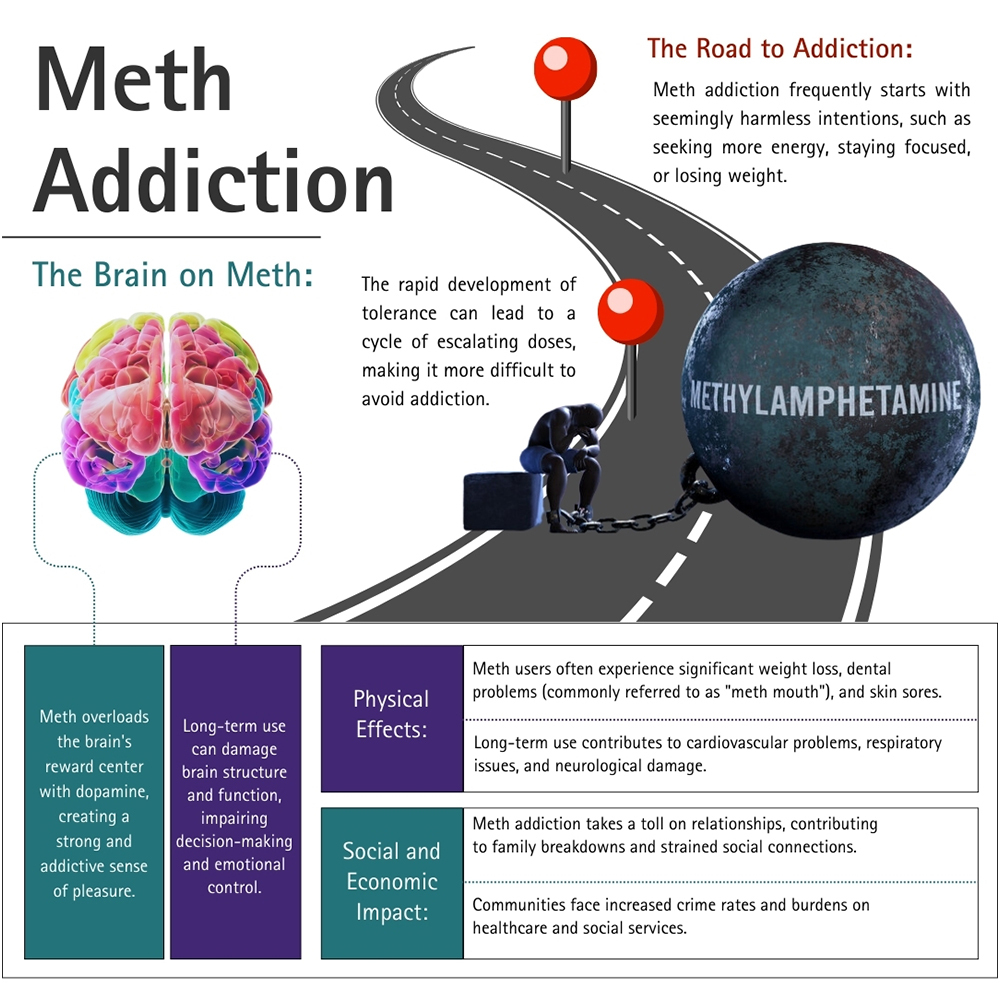Whether you or a loved one is grappling with meth addiction, we are here to guide you through the process of recovery. Discover the treatment options, understand the underlying causes of addiction, and learn about effective medications. We provide the support and information you need to take the first step toward a brighter, addiction-free future.
What Is Meth?
 Methamphetamines, or meth, is a highly addictive drug made from ephedrine or pseudoephedrine, which is commonly found in allergy medication. Meth can be smoked, snorted, or injected.
Methamphetamines, or meth, is a highly addictive drug made from ephedrine or pseudoephedrine, which is commonly found in allergy medication. Meth can be smoked, snorted, or injected.
Why Do People Use Meth?
People may use meth for different reasons. The clinical perspective is that people use meth when other, more healthy, coping skills are not available. Typically people use meth due to trauma. When someone uses meth, they feel a rush of euphoria.
However, after the high wears off meth can have negative side effects such as:
- Paranoia
- Psychosis
- Insomnia
- Hallucinations
- Weight loss
- Tooth decay
- Brain damage
Knowing these consequences, you may wonder why someone would try such an addictive substance. As with any substance use, meth is used as a coping skill after a significant trauma when the individual does not have any healthy coping skills.
Meth use quickly and easily takes away negative feelings such as depression, anxiety disorders, and emotional pain. Trauma damages different parts of the brain such as the hippocampus and amygdala, which are responsible for memory and learning, and aggression and fear respectively, causing people to make poor choices.
Substance use is a disease, according to the Diagnostic and Statistical Manual (DMS-5) that cannot be cured but can be treated. Trauma therapy is the only way to treat a trauma side effect that is meth addiction.

Dangers of Meth Addiction
The dangers of meth addiction include:
- Physical health issues
- Mental health problems
- Overdose
- Crime
- Social problems
Meth addiction is difficult to overcome on your own, but with professional assistance, it can be treated.
Do You Need a Meth Addiction Treatment Program?
Meth addiction treatment provides an additional vital level of support to ensure remission from substance use, such as:
- Processing and healing the underlying causes of meth use
- Developing coping skills
- Increased success rate
- Reduced risk of relapse
- Improved relationships
If you or someone you know is experiencing meth addiction, consider seeking professional help to ensure the support and positive results you are looking for.
What Are the Treatment Options for Methamphetamine Use?
The different levels of care for methamphetamine addiction include:
- Detoxification: Detox programs help you discontinue methamphetamine use and go through withdrawal safely.
- Residential treatment: Also known as inpatient treatment, residential treatment provides you with around-the-clock support to heal your meth addiction.
- Intensive Outpatient Programs (IOP): IOP treatment usually consists of several hours of therapy per day, while living outside of the facility.
- Outpatient treatment (OP): OP treatment consists of weekly trauma therapy sessions and groups.
Typically, an individual would progress from detox to OP in order. However, you can choose any level of treatment that is right for you.
Which Medications Are Effective in Treating Methamphetamine Use Disorder (MUD)?
The only medication that has been FDA-approved to treat MUD is a buprenorphine and naltrexone composite. Buprenorphine helps reduce cravings and withdrawal symptoms, while naltrexone blocks the effect of meth.
Our commitment to delivering top-tier meth addiction therapy is unwavering. We encourage you to explore our wealth of information on treatment options, therapies, and recovery methods. Take the decisive step towards overcoming meth addiction today by seeking the support and guidance you deserve. Your path to a brighter, addiction-free future starts here.

